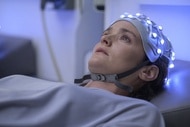Create a free profile to get unlimited access to exclusive videos, sweepstakes, and more!
Arrival - A not really Bad Astronomy review

[Image credit: Paramount Pictures / Phil Plait]
This is not a review of the movie “Arrival”.
OK, maybe it is just a little. I know the movie came out a while back, but it’s quite good, and I have a personal story to go with it. So, to be frank: I really, really liked it. For a lot of reasons.
[I won’t spoil much here. Just a little bit you’ve probably heard anyway, but the big plot points I’ll leave for you to watch. And if it’s still in a theater near you, you should go see it!]
For one thing, it’s a plot-driven movie. There wasn’t a lot of action, or twists and turns just for the sake of trying to make it bigger. The drama revolves around people (well, them and aliens), and how they deal with an extraordinary situation. That was a nice change.
Also, the movie builds. It’s slow, and that’s something you don’t see much anymore. It takes its time, and that’s an important part of the movie, itself. I think younger audiences expect a lot of action and non-stop thrills, and that’s fine every now and again. But a slow burn ... ah, that pays off so much better in the end.
I do have more to say about the aliens, but that will involve a little more spoilerage. So, let me get something else out of the way first.
I was, in a small way, a science advisor on the movie. A very small way! But still, it was enough to get my name in the credits, the first time that’s ever happened in a big-budget Hollywood movie. The fanboy in me is still pretty excited about that!
So, minor spoilers follow. Fairly warned be ye, says I.
First, if you prefer to listen to me blather on rather than read what I’ve written, I talked about all this with my friend Cara Santa Maria on her “Talk Nerdy” podcast. We also talk extensively about politics, and the current political attacks on science, so fairly warned again, says I.
I work informally with the Science and Entertainment Exchange, a program by the National Academy of Sciences to promote better science and representation of scientists in movies, TV, and other media. They get scientists together with writers and producer to exchange ideas, and it’s been a huge amount of fun to work with them. They’ve been kind enough to me to invite me to LA a few times, where I’ll visit several production companies and studios to talk to the creators about their work.
On one of these trips, I happened to visit FilmNation, and talked to a producer there about a science fiction movie they were working on. Not long after, I got an email from him, asking if I’d like to take a look and comment on a script for a different movie they were a part of, called Story of Your Life, based on a short story by Ted Chiang (the name was changed to Arrival later). Of course I agreed, and read the script.
It was great. I knew right away this would be a hit movie. I did have a few comments; nothing major, but worth noting. One was that physicist Ian Donnelly (played by Jeremy Renner) asks if the aliens that have suddenly appeared in our skies have tried communicating with us. One way they could do that is through mathematical codes or symbols, and he asks if we’ve received anything like a “Fourier series”.
That’s a real thing — it’s used in many fields of science, including signal processing and optics; when I worked on Hubble, I used it a lot for that— but it’s not really the right sort of thing for a physicist to ask. It’s more of a mathematical construct than an actual series of numbers, so I suggested that be changed to Fibonacci series, which really is an actual set of numbers; it’s 0, 1, 1, 2, 3, 5, 8, 13…such that the current term is the sum of the two before it. It’s pretty unambiguous and would show right away that aliens and humans could communicate via mathematical knowledge.
I was rather stunned when Donnelly actually says that in the movie. I put words in Renner’s mouth! Coooool.
I also had some comments for the script on how the aliens would look, move, and manipulate their environment (for example, the ends of their tentacles could split and be used as fingers). Some of that was already in the script, and it was fun to think of ways to expand on them. It was nice to see the way the aliens were depicted in the movie; they had an organic and natural feel to me, like creatures that really could have evolved that way.
So like I said, I had a small influence, but it’s the first time I’ve gotten credit in a movie —and it’s such a good movie!— so my pride no doubt exceeds, ever so slightly, my actual involvement.
If you want more info, I suggest reading a linguist’s spoilery opinion of the science in the movie, and a FAQ about the most obvious questions moviegoers have about the plot.
And if you haven’t seen it yet, it came out on DVD on Feb. 14 (though it’s not exactly a Valentine’s date movie), and it’s already out on Amazon and iTunes. So, give this one a watch, and hey: Don’t forget to stick around for the credits.
Tip o’ the logogram to my pal Neil Tyson for a bit of editing advice on this article.


























